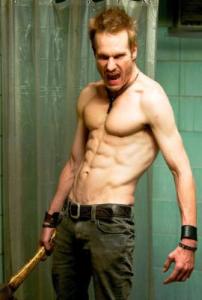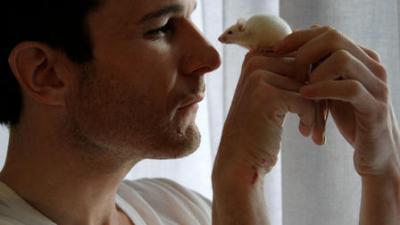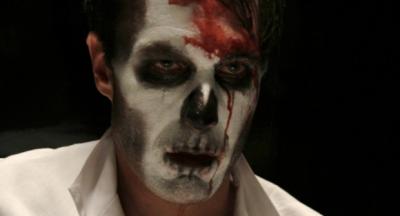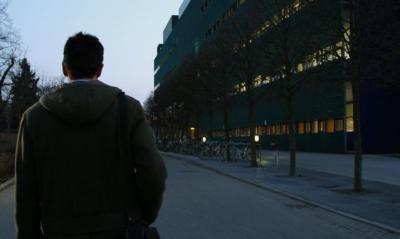By: debbie lynn elias
Michael Eklund. An actor who gets under your skin. An actor whose performances often push the boundaries of sanity. An actor who onscreen typically displays a cadre of negative emotion, anger and violence but who, in reality, is one of the kindest, most generous and gentlest men you could ever hope to meet. An actor whose presence is indelibly etched into the psyche.
For Eklund fans, the past year has been an ongoing Christmas present. Starting out 2012 with the apocalyptic, The Divide, written by Eron Sheean and directed by Xavier Gens, we also saw Eklund in a second apocalyptic thriller, The Day in which he co-starred with Ashley Bell. Reteaming with Bell for 2013’s Marine 3, he can also currently be seen in The Call with Halle Berry. And now we have ERRORS OF THE HUMAN BODY. Unlike anything we have seen from Eklund in the past, ERRORS OF THE HUMAN BODY is a thought-provoking, slow burn thriller that speaks to the moral conscience within each of us when it comes to science versus ethics and playing God. As genetic research scientist, Geoffrey Burton, Eklund brings an arsenal of emotion to the table, creating a powerful movie-going experience that is as intense and emotionally draining for us as an audience as it is for not only the character of Geoffrey Burton, but Eklund himself.
Always a pleasure, I had a chance to talk once again with Michael Eklund in this exclusive interview about acting, Eron Sheean, ERRORS OF THE HUMAN BODY and, of course, working with lab mice versus “movie mice.”
I can‘t believe you actually have time to do interviews! It seems every time I turn around you‘ve got another film coming out. I just talked to Ashley Bell the other week about Marine 3 which you’re also in.
Yep. Marine 3 came out a few weeks ago. And The Call came out a few weeks ago. And the premiere in Canada and then this one this Friday. So that’s why I have all the time [for interviews] because all the work was done a year ago.
I am mesmerized by ERRORS OF THE HUMAN BODY. I love you in roles like you have in The Divide, like you have in The Day – the bad guy roles – but here as Geoffrey, you are so thoughtful and contemplative and so interesting to watch. You drew me in with the first scene.
Oh, thank you very much. ERRORS OF THE HUMAN BODY was a very special film for me, as well. It all came about from doing The Divide with the writer who wrote The Divide, Eron Sheean. This is his first film he directed. Because of my relationship I had with Eron shooting The Divide, we started collaborating on ERRORS OF THE HUMAN BODY. He gave me the script to read while we were still shooting The Divide and then we went from here. We found ourselves in Dresden, Germany six months after shooting The Divide and we made ERRORS OF THE HUMAN BODY.
What is about Eron, as this is a distinctly different film than The Divide, while it deals with issues of mortality and – to a degree medical science and genetic manipulation is apocalyptic in its own nature – that makes you gravitate towards collaborations with him?
Yes. Is it about Eron? [laughing] Eron’s a little mad man of a writer. He writes every genre of different storylines and when I read ERRORS OF THE HUMAN BODY it was so different than The Divide that I knew I wanted to be on board with it the second I finished reading it because I just thought it would be such an experience to shoot a film like that and in Dresden. The whole city itself is another character in the film. It just has that kind of cold, haunting sense of the city and I think we captured it in the film as well.

Interesting is that not only is Eron writing but this is his first feature that he’s directing. How is that for you as an actor with that collaboration that you already have with him but then to have him directing his own words. Does this make it easier for you as an actor, especially with material as intense as this?
I think it helped a lot. Building our rapport on The Divide, we knew really quickly that we worked in the very same way. While we were shooting The Divide, we were changing things as we were going with that movie. I remember times me and Eron were in the bar at the hotel we were staying at while we were shooting The Divide, staying up late, rewriting scenes together for the next day involving my character in The Divide. So it was really that, that we became friends and just realized that we work really well together. Then we started shooting ERRORS and we just kind of switched in a way. This was all from his imagination and his words but we kind of have an unspoken communication between us where I know what he wants and he knows what I want to do and then we kind of collaborated together and created ERRORS.
With a film like this, because of the science involved in it and the fact there really is a Burton Syndrome disease, how much ad-libbing are you allowed to do or how much do you strictly stick to the script because of the scientific premise that underlies this?
ERRORS was 100% scripted. There was no ad-libbing on set for ERRORS. It was all on the page already. It didn’t need it. It didn’t call for it. It wasn’t the environment to have that kind of process on this set. It was very different from The Divide where we were very open to improvising; other films, too. But, ERRORS was such a different film, Eron nailed it right on the head with all the scientific dialogue that’s going on. I wouldn’t know what to ad-lib if I had to! [laughing] I wouldn’t be able to make up stuff like that. It had to be by the book. I didn‘t want to deviate from Eron’s script because it was so powerful already on the page. All I had to concentrate on was the character that I was playing which was a character basically obsessed with details of the disease that killed his child. And then how he lost touch with his humanity which destroyed his marriage and in the long run, his sanity, throughout the film. I just had to attack the internal struggle that the character was going through. That was my job. And then to do the dialogue that Eron wrote, give it justice. I hope I did a really good job.

I think you did a great job. And you got to play with a cute little white mouse.
Yes! There‘s a lot of training with those mice. Extensive training. Those mice are actual lab mice. They weren‘t “movie mice”. They were from the actual institute we were shooting in which is a real genetics facility in Dresden, Germany.We had the scientist who works with mice at the Institute teach me how to handle mice. It was important to me that Geoff knew how to handle these creatures and he did come from a professional background and I thought he had to feel very comfortable with a mouse in his hand and how to play with it in his hand.The mice react to your energy is the first thing I learned from the scientist. There was the antagonist character Jarek [played by Tomas Lemarquis]. If you watch closely in the film, when I handle a mouse it‘s very calming and peaceful and when he handles them it’s more brutal, and [the mice] react very differently. That actor got bit a lot of times by the mouse. I never did. It was the energy.
It explains why in so many of the scenes with Tomas playing Jarek, he wasn’t doing that much handling of the mice. It was basically his “science partner” who was doing the mouse handling.
Exactly. And for Jarek, they were a subject. For “Geoffrey”, and for me, they were a friend. I wanted to have that energy when I came on set to handle the mice. I had lots of training with those mice to get to that point where I could handle them.
You have such a calm persona, very calm demeanor as a person, Michael. We’ve talked together so many times now over the years and I‘ve noticed that you are always very relaxed, very calm. So, I can see why the mice would have the great reaction with you that they did.
Aww. That’s nice to hear. Yea, there’s a trick to it [mouse handling]. And that‘s a compliment to hear that you find me calming because a lot of the characters I play, they aren’t, and I have to bottle that energy and release it at the right time or I think I would lose my own sanity in my real life. Shooting ERRORS OF THE HUMAN BODY, this was just a character I really identified with and really wanted to attack. The things that he was going through are things that I had somewhat gone through, not the loss of a child, but personal or emotional stuff. I wanted to bring that to the role and explore that kind of person. This was probably one of the best experiences that I‘ve had making a movie.
Because of the nature of this role and the very personal level of the character of Geoff, this is very different from what we’re used to seeing you do for the most part. Is it hard for you to channel the private emotion to get into the head space of a character like Geoff as opposed to the violent aspect and tendencies or somebody like Father in The Day?
Definitely. I find the darker characters easier to play. They’re more colorful. You can have a lot of splash on the screen whereas Geoff is more introverted, there’s more going on inside of him. All I knew is that if I felt it in my real life then it would translate onto film. Shooting this movie for over a month and a half in Germany and living in that state for two months, that state that Geoff Burton was in, was draining. I always tell Eron he writes me the most intense, emotionally draining roles that I am fortunate enough to play. After I’m finished I need to recuperate and just rest because the internal emotional journey is just as extreme as the external, if not more. You leave work everyday feeling exhausted and …putting yourself through the same scenario that Geoff was going through. It was hard. It was definitely interesting but that‘s what I look for and that‘s what excites me about a role.

And that‘s what makes you give us such a great performance.
Why, thank you very much! That’s very nice to hear.
You and Eron have this great marriage going here, a great collaborative marriage. Are the two of you planning to work on anything else together?
We always are. We’re always talking more and what the next project will be. As you know it’s always difficult to get a film off the ground, especially today, it gets harder and harder every year, but yea, we talk probably every week trying to get the next one off the ground. What it’s gonna be, I’m not sure yet, but it’s always gonna be something different!
You mentioned that you actually shot this in a genetics institute in Dresden. Does that add, granted the ambient nature of being in the institute adds so much to the film and your performance, but does it also give you any kind of trepidation as an individual, as an actor, knowing that you‘re there with these viruses and genetic manipulations going on around you? Does that enter into the psyche?
Yea! It entered my mind every day. We shot 80% of the film in the Max Planck Institute. They had quarantined areas that we weren’t allowed to go in and they made sure that we knew which areas those were. The best think about the Institute is that they were so warming towards us, they opened up their doors to us and just let us come in and make out movie. It was so nice of them to do that. To be in the real space, the real environment that the movie takes place in helped me a lot. The background actors in the film are the scientists going about their daily routines. They were the extras. If you see a scientist in the background walking around, that’s them working. We were shooting our movie around them while they were handling deadly viruses and whatever else they were working on. It made it very easy for me to feel like I was in the true life environment that Geoff Burton was in.
And every day you were probably praying, “No earthquake, no explosions, I don’t want viruses in the air!”
Exactly! You never know what they’re handling in there. They’re doing some really serious stuff in that place. But, yes, it was very protected and very safe and they were very giving to us. They would tell us what days we could shoot in what area and what was a safe environment and which ones weren’t and we stayed in the safe ones. The part that was intimidating was a scene in the film towards the beginning where I give a lecture about my research that [Geoff] has done in the past and the whole auditorium was filled with the actual scientists of the Institute. Usually that has paid background actors who watch you act all day, but these are actual scientists who do this everyday and to stand in front of them and give a lecture about science was intimidating but it was a lot of fun, too.
And how many takes did that scene take?
We shot that – the full speech – I think we shot it four times. Just keep running it and running it and running it.
That‘s not bad. Having been in so many lecture halls myself, you were very convincing, very small college professorial.
Thanks. Thank you very much. I knew for myself I just wanted to make it as realistic as possible and not glamorize it too much about what I was talking about. I wanted to play it very low key and kinda how it is. Boring. [laughing]
Geoff has interesting relationships with the characters of Rebekka and Jarek. Your chemistry with Tomas Lemarquis [Jarek] is just off the wall at times. How much rehearsal time did all of you have together in preparing for this?
We had zero rehearsal time. We met once and did a quick read through of the script and that’s where we all met for the first time. Then there was a few weeks until we saw each other again and finding ourselves on set working together. So we didn’t have any rehearsal time on this film. It was shot very quickly. We had one camera on set. We didn’t have time to rehearse. Everybody had to basically show up prepared and ready to go. The actors that we had on the film were so good. We had people from all over Europe. Tomas is from Berlin. He was an Icelandic actor. We had Karoline [Rebekka] from Berlin and another actor from France and we had people from all over the place. They were so talented that when the cameras were rolling, everybody was just ready to play. And that’s all we had time for. It was an intense shoot.

Do you prefer to have rehearsal time or not? Do you like to just jump in, especially with a film of this nature?
I don‘t like rehearsal time. I don‘t like to rehearse. I like trying to stay very spontaneous and in the moment. The way I approach my work is that I try to dive into the character‘s mindset as much as I can and become that person as much as I can while I‘m filming the movie. So, the rehearsal time doesn’t really work for me because it would take away from the spontaneous element that I try to bring to it. Whatever happens between action and cut is what happens and whatever the character does is what comes out. I try to make it as truthful as possible because if there‘ a false moment, then it’s a lack of preparation more than anything, but I prefer to keep everything kind of free and loose and play with the other actors. I think rehearsal takes away from that. Especially when youfre having a relationship with [a character] like Jarek where Tomas is such a nice guy in real life, such a great actor and such a lovable person. I didnft want to get too close to him because of the characters in the film. We did bond very much on the movie, as well, but with rehearsal time I think it would have taken away from that [frictioned] relationship we were trying to achieve. Now me and Karoline, we got together more often and worked the scenes in our off times to build that friendly relationship because [Geoff and Rebekka] had a history together. We were trying to get that across early on. We had more time to work on our scenes together but basically more just kind of building the relationship between us as people.
Talking about building relationships here, it looks like you’re going to be re-teaming with Xavier Gens, Michael Biehn, Danielle Harris and Courtney B. Vance to do The Farm.
That’s the plan. We’re supposed to do The Farm. We‘re in the raising the money stage and the whole financial burden of making movies. You need money to make a movie, so we’re at the very early stages right now just trying to find the funding. I would love to work with those guys again and bring the team back together to do this new film which would be a lot of fun.
I look forward to it. I know you’ve got a lot of other films on your plate that are in post right now getting ready to come out so I look forward to all of those, Michael.
Thank you very much. And thanks always for your support.












